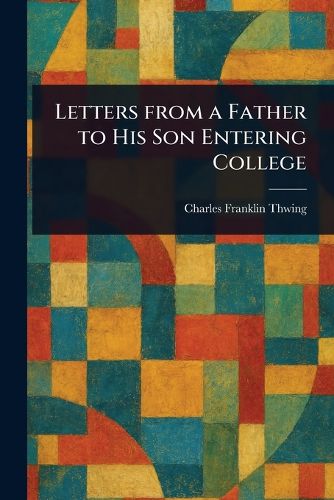Readings Newsletter
Become a Readings Member to make your shopping experience even easier.
Sign in or sign up for free!
You’re not far away from qualifying for FREE standard shipping within Australia
You’ve qualified for FREE standard shipping within Australia
The cart is loading…






This title is printed to order. This book may have been self-published. If so, we cannot guarantee the quality of the content. In the main most books will have gone through the editing process however some may not. We therefore suggest that you be aware of this before ordering this book. If in doubt check either the author or publisher’s details as we are unable to accept any returns unless they are faulty. Please contact us if you have any questions.
"Letters from a Father to His Son Entering College" by Charles Franklin Thwing offers timeless advice on navigating the crucial transition to higher education. Written in the form of personal letters, this book delves into the ethics, challenges, and opportunities that await a young man embarking on his college journey.
Explore themes of education, self-improvement, and the enduring bond of father-son relationships through the author's insightful guidance. Thwing addresses essential topics relevant to college life and beyond, offering motivational and inspirational counsel on personal development.
A valuable resource for anyone interested in the history of education, turn-of-the-century perspectives on higher education, and the timeless wisdom passed down through generations. This meticulously prepared print edition allows you to rediscover the enduring relevance of Thwing's thoughtful reflections on college ethics and the significance of a well-rounded education.
This work has been selected by scholars as being culturally important, and is part of the knowledge base of civilization as we know it.
This work is in the public domain in the United States of America, and possibly other nations. Within the United States, you may freely copy and distribute this work, as no entity (individual or corporate) has a copyright on the body of the work.
Scholars believe, and we concur, that this work is important enough to be preserved, reproduced, and made generally available to the public. We appreciate your support of the preservation process, and thank you for being an important part of keeping this knowledge alive and relevant.
$9.00 standard shipping within Australia
FREE standard shipping within Australia for orders over $100.00
Express & International shipping calculated at checkout
This title is printed to order. This book may have been self-published. If so, we cannot guarantee the quality of the content. In the main most books will have gone through the editing process however some may not. We therefore suggest that you be aware of this before ordering this book. If in doubt check either the author or publisher’s details as we are unable to accept any returns unless they are faulty. Please contact us if you have any questions.
"Letters from a Father to His Son Entering College" by Charles Franklin Thwing offers timeless advice on navigating the crucial transition to higher education. Written in the form of personal letters, this book delves into the ethics, challenges, and opportunities that await a young man embarking on his college journey.
Explore themes of education, self-improvement, and the enduring bond of father-son relationships through the author's insightful guidance. Thwing addresses essential topics relevant to college life and beyond, offering motivational and inspirational counsel on personal development.
A valuable resource for anyone interested in the history of education, turn-of-the-century perspectives on higher education, and the timeless wisdom passed down through generations. This meticulously prepared print edition allows you to rediscover the enduring relevance of Thwing's thoughtful reflections on college ethics and the significance of a well-rounded education.
This work has been selected by scholars as being culturally important, and is part of the knowledge base of civilization as we know it.
This work is in the public domain in the United States of America, and possibly other nations. Within the United States, you may freely copy and distribute this work, as no entity (individual or corporate) has a copyright on the body of the work.
Scholars believe, and we concur, that this work is important enough to be preserved, reproduced, and made generally available to the public. We appreciate your support of the preservation process, and thank you for being an important part of keeping this knowledge alive and relevant.